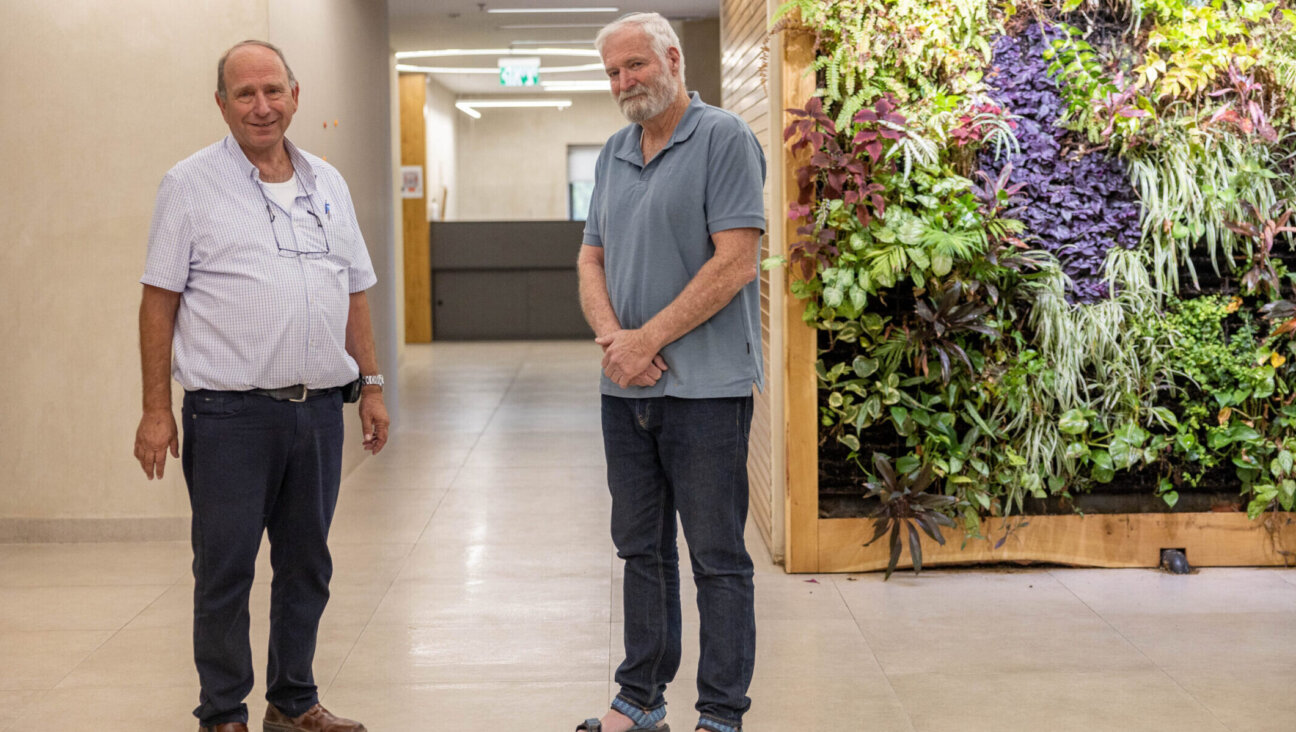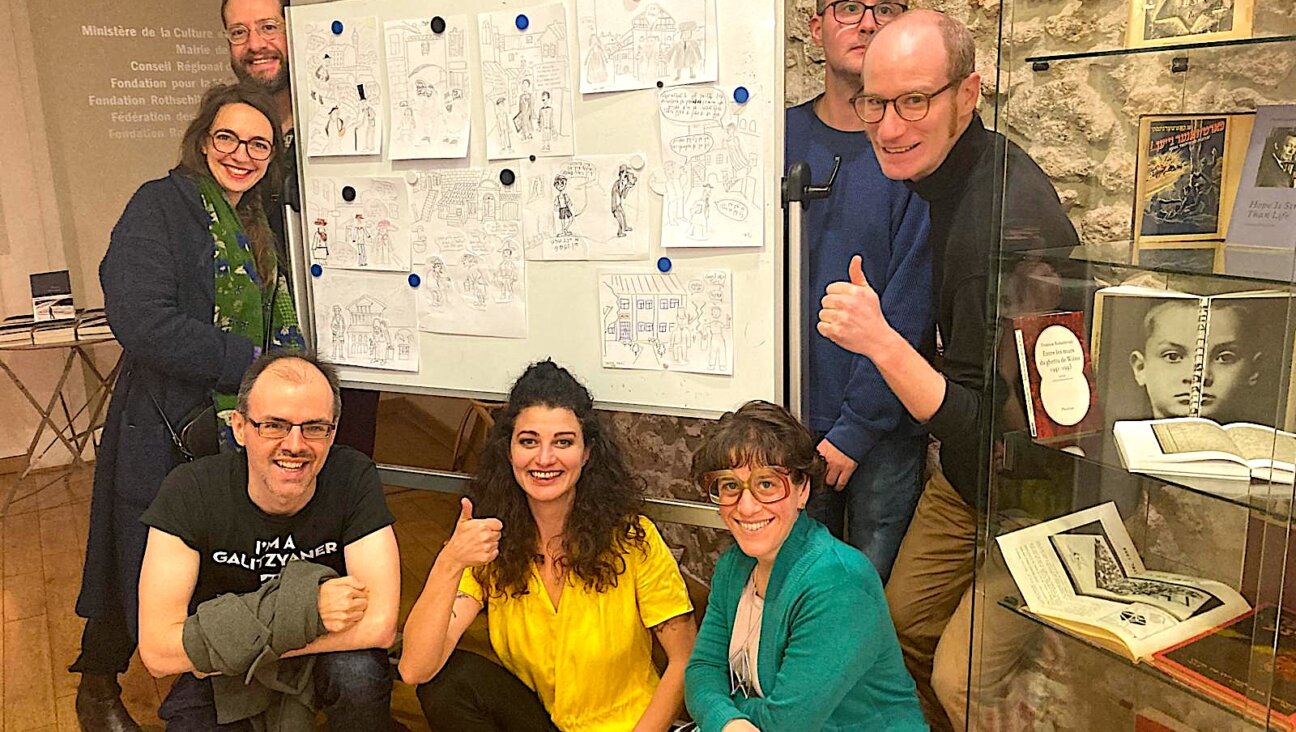In the Company of Men ManKind’s ‘New Warriors’ Embrace Nature, Each Other, ‘Sacred Masculinity’
B y the hearth of a crackling fireplace at the Deer Park Church Camp in rural Pennsylvania, Josh Shaneson was welcomed into a brotherhood of men, for the second time.
Shaneson, 19, had been inducted into manhood once before, as his yarmulke and ritual fringes indicated. But unlike his bar mitzvah, at this initiation he had plenty of company.
The 20 or so men flanking Shaneson — some with baseball caps and gold-cross necklaces, others with yarmulkes — had just emerged from a three-day New Warrior Training Adventure, a ritualistic weekend that aims to open up men to the “sacred masculine.”
Following a round of drumming and a blessing from one of the group’s “elders” at the “homecoming” ceremony, the men discussed the initiation experience while passing around a feathered staff. Between speakers, the men would simultaneously emit a guttural “Ogh!”
Since 1987, some 20,000 men from all religious backgrounds have gone through the New Warrior Training at 27 sites around the world. Though the organizers at The ManKind Project — the nonprofit organization that organizes the weekends — do not collect information on religion, past participants and leaders say they have been surprised by the number of Jewish men, like Shaneson, who have found their way to the training. The Deer Park weekend, with six Jewish participants, was not atypical; in fact, there often are more Jewish participants.
The apparent appeal of the training for Jewish men in particular, from all levels of observance, shines light on the complicated relationship so many Jewish men have with their masculinity.
“The ideal of the Jewish man is more the scholar than the athlete,” said Harry Brod, an associate professor at the University of Northern Iowa, where he specializes in men’s studies, and editor of the anthology “A Mensch Among Men: Explorations in Jewish Masculinity.”
“Because standards of Jewish masculinity are different than in the dominant culture, there are already questions about masculinity in the minds of Jewish men,” Brod said, “and the tendency toward sensitivity in Jewish men makes it okay to explore those questions.”
Judging from attendance at New Warrior Training sessions, many of the men caught in this bind are observant Jews. On Shaneson’s weekend, all six of the Jewish men were Orthodox. The weekends have grown so popular with Orthodox men that this winter, for the first time ever, a Washington-area training was rescheduled to begin after sundown on Saturday so that five Lubavitcher chasidim could take part.
But many of the Jewish men who came forward to talk about their Warrior Training experiences at the Pennsylvania homecoming had not been to a synagogue in years.
Stan Sherman, one such man, who is the enrollment director of the national organization, said that on his first training weekend, in 1997, he turned to a friend and remarked on the incredible number of fellow secular Jews who independently had found the training.
“Yeah, think how much money we’re saving on therapy,” his friend shot back.
The training does demand a bit more than the typical session on an analyst’s couch. While the exact activities are kept secret from nonparticipants, the leaders talk about a ritual hunt (though they are quick to add that no animal is actually killed) and intense emotional confrontations between the initiates and the leaders. Secrecy is an integral part of the weekends, about which information is spread solely by word-of-mouth.
The physical challenge promised by the weekend would naturally be attractive for many Jewish men, says Michael Kimmel, a sociology professor who researches masculinity at the State University of New York at Stony Brook.
“Growing up in my own Jewish neighborhood in Brooklyn,” said Kimmel, editor of “The Politics of Manhood,” “there was a lot of shame to being a Jewish man…. I think this weekend, like a lot of contemporary Jewish politics, comes out of a similar impulse to never let anyone push us around again.”
But the more emotionally in-touch Jewish man of lore does not get left behind in the training. Like a good bagel, the weekends promise that elusive combination of crunchy and chewy.
“It’s not like you go out and eat raw deer,” said Andrew Epstein, 54, a graphic designer from Chicago who went to his first New Warrior Training in 2003. “You go into the woods and process,” Epstein said, “and in the process I, for one, met a network of men who I’ve been able to rely on.”
The ManKind Project is one group in the so-called “mythopoetic men’s movement,” which sprang up during the 1980s with inspiration from the writings of Robert Bly, author of the bestseller “Iron John.” The movement, mocked by its critics for its appropriation of Native American rituals and reliance on New Age self-help models, aims to get men in touch with some sense of “primitive masculinity” by creating trusting relationships between small groups of men.
At the Deer Park graduation, all of the initiates talked about the love they felt for their new “brothers.” At the back of the room, men locked in silent, 30-second bear hugs.
The tribal resonances of such communal bonding are a neat fit for members of the Jewish tribe. Yet the tribal language used during the weekends takes its cue from Native American spiritual rituals, some of which create uncomfortable friction with Jewish tradition.
Group leaders strive to incorporate these rituals into an nonreligious context; at the Deer Park Church Camp, the ManKind Project banner had been draped to obscure a tiled replica of ‘The Last Supper.’
But many Jewish men said that some of the spiritual elements made them nervous, at least initially.
Rabbi Jeffrey Greenberg, 26, who helped lead the training session for Orthodox men near Washington, said that during that weekend he had supervised the kitchen for kosher restrictions and helped provide substitutes for the rituals that had made him uncomfortable during his own training.
Greenberg, a teacher at a Jewish day school in New York, said that many of the rituals were easily infused with a Jewish spirit. The ceremonial sweat lodge, for instance, had an easy precedent in the old-fashioned shvitz.
Such substitutions, though, are not usually made, and many Jewish men came to the weekend looking for a spirituality they felt was lacking in their Jewish experiences, most of all in their first initiation into manhood.
“My bar mitzvah was just a big party,” said Hal Klegman, a 56-year-old executive recruiter from Chicago who completed his first training in 1987. “Spirituality was not what my parents were looking for in a synagogue. Spirituality was the lacking component.”
For Shaneson — a regular Hillel attendee at the University of Pennsylvania, where he is a student — the weekend brought him to see a more intricate set of problems in his own Jewish education.
“We always read what we should be, and we don’t focus on what we are, and how to appreciate that, as the New Warrior Training teaches,” Shaneson said. “The ideal of Judaism can be limiting and restricting.”
For Shaneson, and many other Jewish participants, the weekend caused a re-evaluation of their Jewish connections. In the end, though, most of them talked about feeling closer to Judaism.
Kourosh Babaian, a 25-year-old clothing salesman from New York, said the Deer Park training weekend helped him to “feel more comfortable as a Jew doing everything” and “to experience my religion in a spiritual way.”
The pathways through which this happens have been criticized by a number of feminists, who see the entire mythopoetic men’s movement as reestablishing the old gender hierarchies, a criticism Brod expanded upon.
“The idea that there is some essential manhood that lies in separation from women is a dangerous idea,” Brod said. “Where comes this idea that men can only learn nurturing and emotional support from other men?”
But most of the wives and mothers at the homecoming ceremony seemed thrilled with their new, improved husbands and sons. And the leaders were full of talk about all the old, artificial categories that are broken down by the experience.
“It allowed a bonding opportunity with other men and with the outside world that might not have been possible otherwise,” said Greenberg of the Lubavitcher men who went through the weekend. “They put aside those religious labels, and other externalities, and allowed their core person to come out.”
A message from our CEO & publisher Rachel Fishman Feddersen

I hope you appreciated this article. Before you go, I’d like to ask you to please support the Forward’s award-winning, nonprofit journalism during this critical time.
We’ve set a goal to raise $260,000 by December 31. That’s an ambitious goal, but one that will give us the resources we need to invest in the high quality news, opinion, analysis and cultural coverage that isn’t available anywhere else.
If you feel inspired to make an impact, now is the time to give something back. Join us as a member at your most generous level.
— Rachel Fishman Feddersen, Publisher and CEO






















